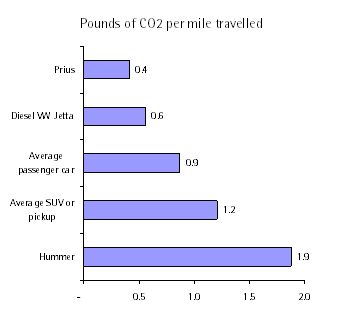Sure, everybody knows that what you drive affects how much you warm the climate. But now, for the graphically oriented: a chart that proves the point!
 |
Just to be clear: this includes only the emissions from the highway fuel itself. It doesn’t include upstream emissions, from drilling for oil and refining it into gasoline or diesel. And it doesn’t include emissions from vehicle manufacturing. In other words, these are conservative figures—so use them with caution.
This is all fairly obvious stuff—I mean, at this point, doesn’t everyone understand that a Hummer pollutes more than a Prius? Still, I think there’s something kind of compelling about this figure. The gap between the Prius and the Hummer is freaking ginormous.
More tellingly, the gap between the Prius and the average car is much wider than between cars and SUVs. Perhaps that’s one reason that the rhetorical war over cars vs. SUVs, which seemed to be in full swing a few a few years back, has cooled a bit recently. In terms of climate change, the divide between super-efficient cars and plain-vanilla combustion engines seems to be where the rubber meets the road.
(Research hat tip to Justin Brant!)








klind
The problem with discussing SUVs is that they are not a homogeneous category. Most of the truck-based SUVs (SUVs built on truck frames with truck engines) like the giant Expeditions, Escalades, Suburbans, etc. are, of course monster fuel hogs. The Hummer, which is based on a military frame rather than truck frame is perhaps the worst.However the fastest growing group of SUVs are the small car-based SUVs such as the Honda CR-V, Toyota RAV4, Subaru Outback, etc. These cars are really just small station wagons with slightly higher rooflines and more aggressive styling. Many of them are also sold in traditional front wheel drive rather than 4×4. For example, the Honda CR-V is really just a Honda Civic with a boxier body.
Sungsu
I’d like to know where passenger cars like the Toyota Yaris (34 mpg city) and Smart for Two (40+ mpg city) fall on the chart.
Thom Egys
If we continue with conservative estimates we will never know the true impact our technology has on the environment. I have heard that the Prius is actually horrible for the environment, even worse than the Hummer because the car is not entirely manufactured in Japan. Part of the Battery system is built in the USA, then it is shipped to Japan, then it is shipped back to the USA, then shipped pack to Japan for final production. Then, of course, the car is shipped back to the USA for sale. Frieght does matter. Manufacturing does matter. It’s these estimates we need to know in order to hold industry accountable.
Had C. Walmer
I’m 52 now, way beyond typical biker age (my perception); I’ve started riding bike to work and I love it – thanks Sightline/Tidepool!Roads ARE dangerous, be careful!